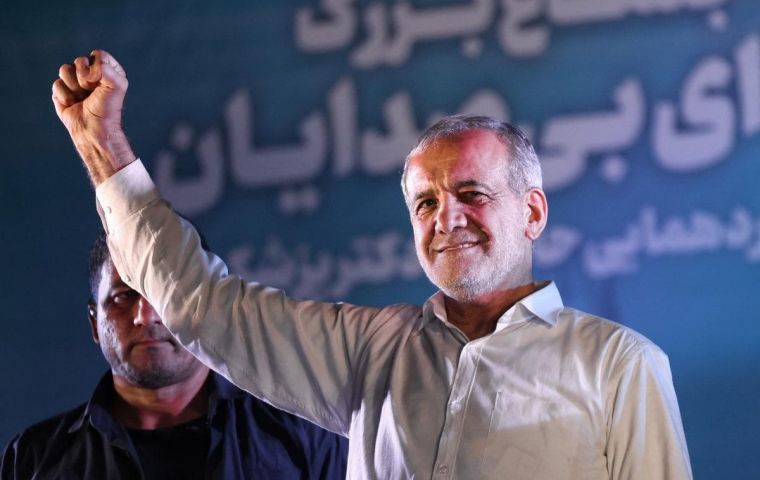MercoPress. South Atlantic News Agency
Pezeshkian becomes Iran's new President-elect
 Pezeshkian has been critical on the veil imposed on women and is expected to seek a rapprochement to the West
Pezeshkian has been critical on the veil imposed on women and is expected to seek a rapprochement to the West Heart surgeon and former Health Minister Masoud Pezeshkian has been confirmed Saturday as the winner of Iran's presidential election. The 69-year-old Reformist politician is expected to open up the country after seizing 53.6 % of the vote against the ultraconservative Saeed Jalili's 44.3 % amid a 49.9% turnout.
“Thus, Mr. Masoud Pezeshkian is the winner of the fourteenth presidential election of the Islamic Republic of Iran,” announced Iranian Electoral Commission Spokesman Mohsen Eslami.
Pezeshkian, who based his campaign on a message of moderation, rapprochement with the West, and criticism of the veil, will become the ninth president in the history of the Islamic Republic of Iran and will succeed the ultra-conservative Ebrahim Raisi, who died in a helicopter accident in the East Azerbaijan Province on May 19.
The 5t8-year-old Jalili, known for being a negotiator during nuclear talks with world powers, was perceived as a prolongation of Raisi's social and political repression. However, Iran's president has decision-making powers on domestic issues and to a lesser extent on foreign and security policy in Iran, where the supreme leader, Ali Khamenei, serves as head of state with sweeping powers. Hence, what Pezeshkian can or cannot do remains to be seen.
The low turnout has been perceived internationally as a sign of dissatisfaction with the political system established by Ayatollah Ruhollah Khomeini after the 1979 revolution toppled the Shah. Still, Pezeshkian secured 16.4 million votes, while Jalili received 13.5 million votes, from a turnout of 30.5 million.
According to Iranian law, a candidate needs to garner at least 50% plus one vote; thus, after no candidate achieved this in the first round on June 28, the election went to a runoff between the top two contenders.
Pezeshkian served as health minister in the 2000s and as first deputy speaker of parliament from 2016 to 2020.
Both candidates were approved by Iran’s Guardian Council, a panel of clerics and jurists that holds veto power over legislation passed by parliament and determines who can seek office in the Islamic Republic.
Given the current parliamentary recess, It remains to be announced when Pezeshkian will be sworn into office. According to Al Jazeera, Ali Akbar Ranjbarzadeh, a member of the parliament's governing board, said the legislative body is prepared to host the swearing-in ceremony this week if Pezeshkian’s team is ready. The Iranian week starts on Saturdays.
“Dr Pezeshkian will have to tender his resignation as a member of parliament to the governing board, and lawmakers must accept it,” he told the semi-official Tasnim news website. Pezeshkian has been a longtime member of parliament from Tabriz. The president-elect can then begin coordinating with the parliament on proposing his cabinet for approval, it was also explained.
Iran has been involved in several high-profile cases in South America. It is said to have sponsored the bombing of Israel's Embassy in Buenos Aires in 1992 and of the Argentine-Israeli Mutual Association (AMIA) in 1994. More recently, it was hit by the controversial Boeing 747-300 freighter aircraft formerly owned by Mahan Air and sold to Venezuela's Emtrasur which was seized by Argentine authorities and handed over to the United States for its alleged participation in terrorist missions. In addition, Iran is said to have military facilities in Bolivia.




Top Comments
Disclaimer & comment rulesCommenting for this story is now closed.
If you have a Facebook account, become a fan and comment on our Facebook Page!